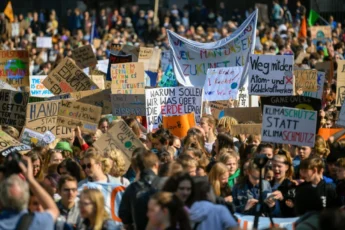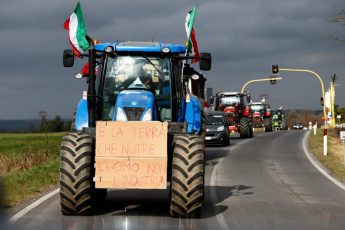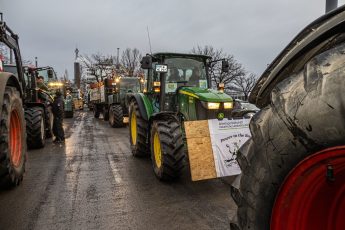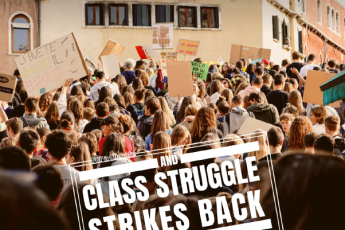
by CLIMATE CLASS CONFLICT
The current wave of farmers’ protests both shows that key changes are happening within the green transition, and contributes to hiding the material conditions of millions of people, mainly migrants, working in that sector for a wage. The green transition applied to agricultural production does not affect only the profits of big and small farmers, but it directly impacts the way millions of women and men are forced to reproduce their lives. This is a political problem that cannot be avoided, and we cannot be content with the alternative now displayed between the protection of agricultural profits and the right-wing offensive against any action to prevent a climate collapse. It is precisely this alternative that makes a climate class conflict both urgent and more difficult right now. This is why in the following weeks we will host a series of contributions on farmers’ protests, with a focus on how the green transition impacts our lives and conditions of struggle. We find it urgent to open a space of discussion that can raise questions and foster a collective reflection on what it means today for us to organize, as workers and activists, to struggle for a better climate as a class.
Conflicts within transnational capital
In the past few months, the reorganisation of capital and states in response to the economic turmoil and the war seizing our present, with the EU and its member states actively involved both in Ukraine and in Gaza, has triggered farmers’ protests across Europe. In April 2023, the Polish and Hungarian governments introduced protectionist measures to defend the interests of their national agricultural capitals, affected by the low prices of Ukrainian wheat exporters. As the margin of profits is still very small, the protests have continued until today. Moreover, similar demands are now being raised in Romania by a few large landowners. A few weeks ago, the cut in fuel subsidies for budgetary reasons sparked protests also in Germany, with tractors blocking roads and entering city centres. The protests then spread to Italy, France, and across Europe, adding to the list of grievances the allegedly illegitimate costs imposed by the EU to make agricultural production supposedly greener, thus directly attacking the European Green Deal and the Common Agricultural Policy (CAP).
These protests tell us something about the nature, purpose, and contradictions shaking the green transition in Europe. Just as the Commission was preparing to derogate the use of pesticides and soften decarbonisation measures in the wake of farmers’ protests, the Vice President in charge of climate policy, Maroš Šefčovič, declared that the green transition is first and foremost about reorganising exploitation and capital accumulation to defend European industrial production. A large transnational green factory, which cannot stand without accelerating its expansion into food production.
For almost seventy years now, the CAP has struggled to coordinate agricultural production on a European level. To ensure the competitive position of the sector on the transnational market, CAP policies provide subsidies to farmers through public spending to compensate them for low profit margins and secure lower wholesale prices. Green transition policies now aim to accelerate the industrialisation and financialization of the sector. The recent European proposal links CAP subsidies to the preservation of at least 4 percent of the land for regenerative purposes, thus avoiding the cultivation of these plots of land and promoting their transformation into financial products, according to the same principle of the carbon trade market (ETS). Efforts were also made to reduce the use of pesticides and fertilisers, a measure that farmers denounced as an obstacle to their activities as it reduces the productivity – and thus the profit – of the land. In this sense, these measures set the stage for a confrontation between different fragments of capital, as smaller producers, faced with transnational competition in production and distribution, do not want to give up part of their profits to obtain European benefits. In fact, just as ‘set-aside’ favours big producers and extensive agriculture, the process of financialization favours large multinational capitals seeking to acquire more land to exploit. The latters also find opportunities for greater profits in the privatisation of insurances against the effects of the climate crisis on crops, which have been turned into a matter of individual producer responsibility just as the climate crisis produces more and more dramatic effects, especially on food production.
What these protests show
This so-called ‘green’ transition continues to determine how people are exploited and impoverished and why climate shall always come after capital. Within this process, only those who have enough social power to defend and assert the absolute priority of their interests can dump the costs onto others. As the European Union experiences a shift to the right, farmers find fertile ground to articulate in protectionist terms the necessity of defending their profits.
Even though there are voices from the protests affirming that they take a stand for a more just and climate-friendly way to produce food, the main narrative displayed presents a strict alternative between green policies and producers’ interests. For this reason, far-right and conservative parties can exploit the protests to discredit any idea of a green transition and climate and social justice. Moreover, military spending to keep Europe at war now requires the sacrifice of green policies and welfare spending, so that the Green Deal is less and less ‘green’, and the possibility to ‘deal’ itself, if it still exists, is a privilege of the bosses, big and small. We believe that our urgency is to find a path beyond the alternative between different kinds of profit and owners’ private interests; an alternative that now makes it impossible to prioritise and politicize the working and living conditions of millions of people employed in this sector, many of them migrants whose residence permit depends on having or not a job, who are affected by the green transition; that makes it impossible to open spaces to build a collective power against these imposed social conditions of the reproduction of our lives.
What these protests hide
The ongoing attempts to accelerate the transformation of the European food production is a process that will characterize the green transition in the next years. What is at stake for us are the perspectives and opportunities for practicing a transnational climate class conflict within and against this process. The green transition is tightening its grip on the living and working conditions of millions of people, who are the first to suffer from businesses’ cutbacks and from governments’ decisions to invest their national budgets more in military production, than in measures against the inflationary spiral that has been impoverishing wages for years now.
Among these contradictions, the attacks on workers, locals and migrants, the nationalistic propaganda, and the market agreements between big transnational actors seeking to find their comfort profitable zone in this global disordered scenario of war and competition, the path for a climate class movement seems narrow. It is the attempt to foster a new regime of agricultural capital accumulation that the farmers are reacting against. There are differences in the way people will be put at work within this new regime: levels of automation, types of production, and conditions of the agricultural labour force are not the same everywhere. We think that to imagine a way out of this polluting and exploitative system, we need to open a space for a collective reflection on how we can tackle these differences and build the social power we need to have a say in this otherwise destructive process.





